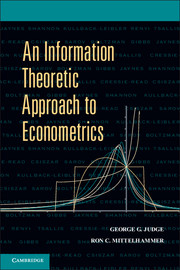Book contents
- Frontmatter
- Contents
- Preface
- One Econometric Information Recovery
- Part I Traditional Parametric and Semiparametric Econometric Models: Estimation and Inference
- Part II Formulation and Solution of Stochastic Inverse Problems
- Part III A Family of Minimum Discrepancy Estimators
- Seven The Cressie-Read Family of Divergence Measures and Empirical Maximum Likelihood Functions
- Eight Cressie-Read-MPD-Type Estimators in Practice
- Part IV Binary–Discrete Choice Minimum Power Divergence (MPD) Measures
- Part V Optimal Convex Divergence
- Abbreviations
- Index
- References
Seven - The Cressie-Read Family of Divergence Measures and Empirical Maximum Likelihood Functions
from Part III - A Family of Minimum Discrepancy Estimators
Published online by Cambridge University Press: 05 June 2012
- Frontmatter
- Contents
- Preface
- One Econometric Information Recovery
- Part I Traditional Parametric and Semiparametric Econometric Models: Estimation and Inference
- Part II Formulation and Solution of Stochastic Inverse Problems
- Part III A Family of Minimum Discrepancy Estimators
- Seven The Cressie-Read Family of Divergence Measures and Empirical Maximum Likelihood Functions
- Eight Cressie-Read-MPD-Type Estimators in Practice
- Part IV Binary–Discrete Choice Minimum Power Divergence (MPD) Measures
- Part V Optimal Convex Divergence
- Abbreviations
- Index
- References
Summary
Introduction
Given Chapters 4 and 6, the reader may be expecting another empirical likelihood (EL)-like functional or divergence measure to be introduced in this chapter. However, we do even more. We provide an entire family of likelihood functionals-divergence measures that includes the maximum empirical likelihood (MEL) and maximum empirical exponential likelihood (MEEL) formulations discussed in Chapters 4 and 6.
We remind the reader that in Chapter 4 we started the pursuit of the solution to a stochastic inverse problem that was based on indirect noisy observations. In this context, we noted in Chapter 2 that when the functional form of the likelihood function is known, the maximum likelihood concept provides an appealing basis for estimation and inference. However, if sufficient information about the underlying data sampling process is not available to specify the functional form of the likelihood function, parametric maximum likelihood (ML) methods are fragile and lose their attractive optimal statistical characteristics. In econometrics, information about the underlying data sampling process is usually partial and incomplete. Consequently, estimation and inference over the past two decades has, as demonstrated in Chapter 3, proceeded under semiparametric formulations in the sense that the joint probability distribution of the data is unspecified, apart from a finite set of theoretical moment conditions or conditional moment restrictions.
- Type
- Chapter
- Information
- An Information Theoretic Approach to Econometrics , pp. 135 - 152Publisher: Cambridge University PressPrint publication year: 2011



